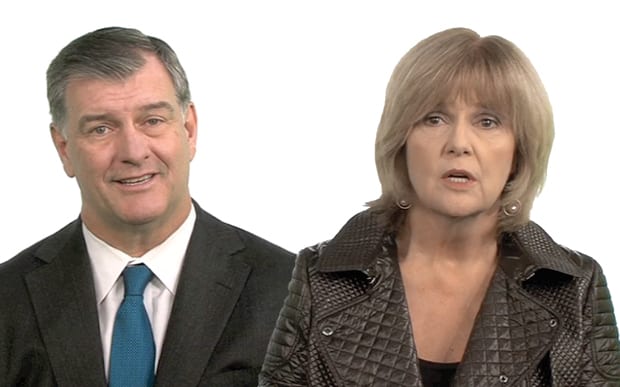Mayor Mike Rawlings, City Manager Mary Suhm, 13 gay city employees appear in segment produced for project aimed at LGBT youth
A city of Dallas video is now among the more than 50,000 “It Gets Better” videos meant to inspire LGBT youth and let them know a better future is ahead despite current challenges.
The video, released exclusively to Dallas Voice this week, features 13 gay and lesbian city employees from different departments who discuss growing up, coming out, bullying and working in Dallas. Mayor Mike Rawlings and City Manager Mary Suhm are also in the video and speak about their pride in the city’s diverse makeup.
Suhm said she came up with the idea after she saw the Austin Police Department’s “It Gets Better” video featuring gay officers in September.
Suhm wanted to take the idea and expand it to include all city employees to demonstrate diversity’s importance in the city’s workforce.
“It’s really important that the city workforce mirror the community that we live in and that we serve,” Suhm said. “I think the message is it’s a good place to work, it’s a safe place to work, that we need everybody, we need everybody’s ideas and energies. I want everybody to feel comfortable to be a part of our workforce.”
Suhm then brought the idea to Rawlings, who said he thought it was a great idea and wanted to be involved. He said he hopes the video shows that people are accepted in Dallas regardless of their sexual orientation and that it will help struggling LGBT youth overcome obstacles in their lives.
“Hopefully it says at the top of the city we believe in two things. One, acceptance regardless of someone’s sexual orientation. And second, as a young person that’s struggling, getting bullied or abused in some manner, that you can power through this and while it’s difficult other people have come through it,” Rawlings said. “I’ve been through difficult times and we all face our own challenges and you’ve got to persevere. And hopefully somebody might say that a mayor who cares about this issue could give me hope.”
Stephanie Laffin, secretary of the It Gets Better Project Board of Directors, said Dallas is among several other municipalities, including Chicago,
San Francisco and Seattle, to make a video. She said cities that participate in the project have a meaningful impact by showing how welcoming they are to citizens and employees.
“It is so important to show LGBT and queer-identified people that there are safe and welcoming cities and towns, guided by supportive leadership,” Laffin said.
Frank Librio, director of the city’s public information office, said Suhm asked him to work on the project. Being in his position for more than seven years and being openly gay, he said he knows a lot of employees and approached his gay colleagues about being in the video. The response was overwhelmingly positive.
He conducted all the interviews over two days in November. Librio, who also appears in the video, is among employees who get emotional on camera while speaking about their youth.
“I think that each city employee that participated in the video takes viewers on a journey through some difficult times in their life but also ultimately shows viewers how their life got better and how they found a community and employer that accepts them, values them and appreciates their creativity, talent and voice,” Librio said.
The video was made at a cost of $4,100 and funded by private donors Ed Oakley, Gregg Kilhoffer and Caven Enterprises. Librio hired two makeup artists and a professional editor to shoot and edit the five hours of interviews. After watching about 60 “It Gets Better” videos to get an idea of how he wanted Dallas’ to be produced, he said he oversaw six different versions before selecting the final one, which is about 13 minutes long.
Along with incorporating the traditional feel of the project’s videos by sharing personal stories, Librio said having Suhm and Rawlings speak about how welcoming the city is as a place and as an employer sends a stronger message.
“With the mayor’s participation and Mary’s part telling people who may be looking at the city as a potential employer that it is a safe place to be and you are accepted here, I think that’s a really important message,” Librio said.
Patti Fink, president of Dallas Gay and Lesbian Alliance, said she was proud that the city took the initiative to make the video, and it demonstrated how supportive the city is of its LGBT citizens and employees. “I think taking the initiative to do something in support of the LGBT community is advocacy and leadership,” she said. “That speaks very well of the leadership at City Hall.”
Other city employees featured in the video are: Mark Doty, historic preservation officer; Theresa O’Donnell, director of sustainable development and construction; Detective Laura Martin, LGBT liaison for the Dallas Police Department; Joey Zapata, assistant city manager; Melissa Miles, assistant city attorney; John Rogers, assistant city attorney; Gary Sanchez, Councilwoman Delia Jasso’s assistant; Patricia Marsolias, director of civil service; Margarita Ortez, code compliance officer; Stephanie Flores, code compliance officer; Betty Swinners, volunteer coordinator; Kevin Lefebvre, senior environmental coordinator.
This article appeared in the Dallas Voice print edition January 11, 2013.


